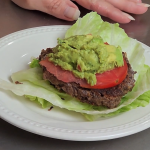Introduction: What is an Alpha-Gal Friendly Diet?
When you’re diagnosed with Alpha-Gal Syndrome (AGS), it can feel overwhelming.
There’s no pamphlet that explains the next steps, no “eat this, not that” instruction booklet, and certainly no simple guide on how to replace the macro- and micronutrients you’ve suddenly lost from your old diet.
An AGS-friendly diet means avoiding mammalian meats (like beef, pork, and lamb), dairy products, and many hidden animal byproducts. These foods aren’t just sources of calories—they’re also rich in important nutrients our bodies need to stay healthy.
That’s why it’s so important to understand which nutrients are most at risk when we remove these foods, and how we can rebuild a balanced, nourishing diet.
In this post, I’ll walk through:
- Which key nutrients to watch
- What can happen if we miss them
- And how using a tool like Meal Garden can make it easier to track, plan, and protect our health on an AGS-friendly journey
Which Nutrients Might Be at Risk?
When we cut out mammalian meats, dairy, and byproducts, we’re not just changing flavors on our plates—we’re also removing foods that naturally supply important nutrients. Here’s what to watch, why it matters, and where AGS-friendly diets can make up the difference:
✅ Protein
Red meat and dairy are easy protein sources—but luckily, many AGS-friendly options remain:
- Poultry
- Fish and shellfish
- Eggs
- Legumes (beans, lentils, chickpeas)
- Soy products (tofu, tempeh)
- Nuts and seeds
Iron
Red meat is especially rich in heme iron, which our bodies absorb most efficiently.
Plant-based (non-heme) iron sources can still help:
- Lentils and beans
- Spinach and other leafy greens
- Pumpkin seeds
- Quinoa
- Fortified (certified vegan) cereals
Tip: Pair plant-based iron sources with vitamin C-rich foods (like bell peppers or citrus) to help your body absorb more.
Vitamin B12
Mostly found in animal products. AGS-friendly sources:
- Fish and shellfish
- Eggs
- Fortified (certified vegan) plant milks and cereals
- Supplements (check with your doctor about dosage and type)
Zinc
Important for immunity and wound healing:
- Chickpeas and other legumes
- Pumpkin seeds
- Quinoa
- Oysters and other shellfish
- Eggs
Omega-3 Fatty Acids (EPA & DHA)
If we don’t eat mammalian meats, dairy, or avoid fish, omega-3s can drop.
But if fish is tolerated:
- Fatty fish (salmon, sardines, mackerel)
- Shellfish
Plant-based options (which mostly supply ALA, not EPA/DHA):
- Flax seeds
- Chia seeds
- Walnuts
For those avoiding fish: consider algae-based supplements to get direct EPA & DHA.
Calcium
Without dairy, calcium must come from other AGS-friendly foods:
- Leafy greens (collard greens, bok choy, kale)
- Canned fish with bones (salmon, sardines)
- Certified vegan fortified plant milks, yogurts, or juices
Vitamin D
Supports bone health and immune function—and many people are low even without dietary restrictions.
AGS-friendly sources:
- Fatty fish (salmon, sardines, mackerel)
- Eggs (specifically the yolk)
- UV-exposed mushrooms (look for “vitamin D enhanced” on the label)
- Limited sun exposure (depending on your location and skin type)
- Certified vegan vitamin D2 or plant-based D3 supplements (from lichen)
⚡ Other Lesser-Known Nutrients
Red meat also provides creatine, carnitine, and taurine—compounds linked to muscle health and energy.
Our bodies usually make enough, but some people (especially athletes) may feel a difference after removing red meat.
By knowing what nutrients to watch—and where to get them from AGS-friendly foods—we can build a balanced diet without feeling restricted.
⚠️ What Happens if We Miss These Nutrients?
These nutrients do more than fill a chart—they directly affect how we feel, move, and think.
Low Iron & B12 → Fatigue, Brain Fog & Hair Loss
- Tiredness, weakness, or dizziness
- Trouble concentrating or brain fog
- Over time, anemia—which can also lead to hair thinning or shedding
Low Omega-3s → Mood & Cognitive Changes
- Mood swings
- Memory issues
- Increased inflammation, which can also affect skin and scalp health
Low Calcium & Vitamin D → Bone & Muscle Issues
- Muscle cramps or aches
- Higher risk of fractures
- Lowered immune function (from vitamin D deficiency)
Low Zinc → Weaker Immunity, Slow Healing & Hair Loss
- Slow healing wounds
- More frequent infections
- Hair thinning or increased shedding, since zinc supports healthy hair growth
⚡ Low Protein & Other Compounds → Muscle & Energy Effects
- Muscle weakness
- Feeling sluggish
- Slower recovery from exercise or illness
These effects often build up slowly—making it easy to miss until they start affecting daily life.
The Challenge: Tracking & Balancing – and How Meal Garden Helps
It’s not just about knowing what to eat—it’s about actually doing it every day.
Why it’s hard to track nutrients manually:
- Needs change daily
- Hidden byproducts complicate food choices
- Manually tracking can be time-consuming and discouraging
Meal Garden makes it easier:
- Breaks down each recipe into macro & micronutrients
- Lets you see daily totals and spot gaps easily
- Helps build balanced weekly meal plans
- Stores your favorite AGS-friendly recipes
- Adjusts as your food tolerances change
Instead of guessing, you get clear, visual data to guide your choices—making it simpler and less stressful.
Tips for Success on an AGS-Friendly Diet
Keep a pantry of AGS-safe, nutrient-dense foods:
Fatty fish, eggs, legumes, nuts, leafy greens, fortified vegan products, and mushrooms.
Use Meal Garden to meal plan weekly:
See gaps before they become issues.
Rotate protein sources:
Eggs, fish, beans, poultry, and tofu each bring something different.
Check your nutrient intake monthly:
Adjust plans as needed, and consult a dietitian if big gaps remain.
Focus on food first—but supplement when needed:
Certified vegan vitamin D, algae-based omega-3s, or B12 can help fill gaps.
Connect within Alpha Gal Pal:
Start or join groups to swap meal ideas, recipes, and support from others who truly get it.
Closing: Nourishing Your Body (and Your Peace of Mind)
Living with AGS isn’t just about avoiding triggers—it’s about building a diet that keeps you strong, energetic, and thriving.
With Meal Garden, mindful planning, and the Alpha Gal Pal community, you can move from guessing to knowing—and from feeling restricted to feeling supported.
Join us, share your journey, and discover how nourishing your body can feel simpler and more joyful—together.
Hi, I'm Mahina - the voice behind The Pal Post curtain. I never set out to be a blogger, but sometimes life throws us a curve ball and we are forced to make lemon-aid...or...yeah, you know what I mean!
Having AGS has changed my life, but luckily, (for me) it has not all been for the worse. I happen to enjoy lemon-aid. Seriously though, I'm so sorry about why you are here - but I am happy that you found us!
My goal is keep the blogs short and informative while served with a side of humor, because I know first hand that AGS already consumes so much of our time (and our overwhelming thoughts).
Please be sure to comment so I know you're out there!
- Because I Cluckin' Care, Mahina -
- Mahinahttps://www.thealphagalpal.com/author/mahina/
- Mahinahttps://www.thealphagalpal.com/author/mahina/
- Mahinahttps://www.thealphagalpal.com/author/mahina/






